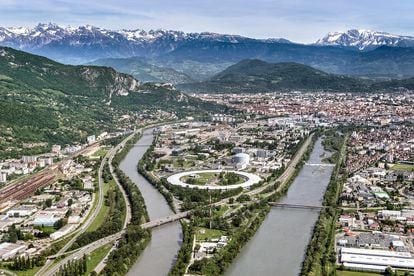Humanity has been faced with a huge challenge for half a century: to figure out the shape of the basic building blocks of life, an essential knowledge to cure diseases that are now deadly. Water is very easy to imagine. They are just two hydrogen atoms joined to another oxygen: H₂O. But the protein that makes the blood red, hemoglobin, responds to the devilish formula C₂₉₅₂H₄₆₆₄N₈₁₂O₈₃₂S₈Fe₄. The American biologist Cyrus Levinthal calculated in 1969 that it would take longer than the time elapsed since the origin of the universe - about 14 billion years - to unravel all the possible configurations of a single protein. However, an artificial intelligence system from the Google conglomerate has managed to do it in a few minutes. His predictions for virtually all human proteins are made public this Thursday.It is a giant leap for biology. Humanity takes off a blindfold.
At the forefront of this revolution is 44-year-old British neuroscientist Demis Hassabis. The researcher was a child prodigy of chess and in 1997 he was marked by the fight between the Russian master Gari Kasparov and the supercomputer Deep Blue. The computer won that battle, but Hassabis was left with the feeling that it was a crude thing, useless if you had to play at three in a row. When the last game was over, the then Cambridge University student set out to design a machine capable of learning any game. In 2010, Hassabis founded the company DeepMind to power artificial intelligence. In 2013, his first creature had learned alone to play and win in different video games of the legendary Atari video game console. In 2014, Google bought the company for about $ 650 million.
British neuroscientist Demis Hassabis, founder of DeepMind.DeepMind
After their training with video games, DeepMind scientists have set out to try to solve one of the greatest challenges in biology.
Proteins - like hormones, enzymes, and antibodies - are tiny machines that carry out the basic functions of life.
They are made up of chains of other smaller molecules, amino acids, like a string of pearls.
These necklaces fold into convoluted configurations that determine their function.
Antibodies, the human body's defenses against invaders such as coronavirus, are Y-shaped.
The recipes for all the proteins it needs to function are written in the DNA of each cell. DeepMind's system, dubbed AlphaFold, reads that information - a sequence of amino acids - and predicts the structure of each protein. Its precision is similar to that achieved with experiments in the laboratory, which require significantly more time and money. It is like guessing the shape of an omelette when you first see a recipe with eggs, potatoes, onion, oil and salt.
DeepMind and the European Molecular Biology Laboratory have published more than 350,000 structures on Thursday, including those of some 20,000 human proteins and those of 20 other organisms, such as the laboratory mouse and the tuberculosis bacterium.
Scientist Venki Ramakrishnan, winner of the Nobel Prize in Chemistry in 2009, says it is "an amazing breakthrough" with unpredictable consequences.
“It has happened much earlier than many experts would have predicted.
It is going to be exciting to see the many ways in which biological research is going to radically change ”, said Ramakrishnan, of the Laboratory of Molecular Biology in Cambridge (UK), in a statement.
The system is "a true revolution for life sciences", in the words of scientist Edith Heard
Some organizations are already working with the new database. The Drugs for Neglected Diseases Initiative, a non-profit organization promoted by Doctors Without Borders, uses the structure of proteins to search for new treatments. Virtually all diseases, from cancer to Alzheimer's to covid, are related to the form of some protein. Other institutions, such as the University of Portsmouth (UK), are using the program to try to design proteins capable of recycling plastics.
Demis Hassabis, CEO of DeepMind, has announced that his plan is to publish 100 million structures in the coming months. That would mean offering free shape prediction for virtually all proteins with a known amino acid sequence. "We believe that this is the most important contribution so far of artificial intelligence to scientific knowledge," Hassabis has proclaimed.
The Spanish Bernardino Romera Paredes, a DeepMind computer engineer born in Murcia 35 years ago, participated in
his study, published this Thursday in the journal
Nature
.
The AlphaFold system is not born out of nowhere, as Edith Heard, general director of the European Molecular Biology Laboratory, an organization with 1,800 workers and offices in Germany, France, Italy, the United Kingdom and, since 2017, in Spain, in Barcelona has emphasized. .
"AlphaFold has been trained using public resource data created by the scientific community, so it makes sense for its predictions to be public," Heard said.
The researcher speaks of "a true revolution for life sciences, as genomics was decades ago."
The Grenoble synchrotron (France), with its characteristic circular shape.ESRF
To determine the real structure of a protein, very expensive infrastructures are needed, such as the European Synchrotron Radiation Laboratory, a circular facility almost a kilometer in circumference in Grenoble (France). The radiation emitted by the electrons that circulate through the ring, basically composed of X-rays, allows us to observe the secrets of matter. The Spanish biologist José Antonio Márquez explains that elucidating the shape of a protein with a synchrotron, or with the alternative method of electron cryomicroscopy, can take “months or even years”. AlphaFold does it in minutes, but with bugs.
“These are computer predictions, not the experimental determination of the structure. And the precision is 58% ”, underlines Márquez, a 52-year-old Valencian researcher who directs the Crystallography Platform of the European Molecular Biology Laboratory, in Grenoble. Today, if a scientist wants to study a protein implicated in cancer, he has to wait months or years to analyze its shape. There are only about 180,000 structures in the databases. The information published this Thursday doubles that figure. And in a few months it will be millions. “The normal thing today is not to find a protein in the databases. With AlphaFold you can have a prediction with 58% reliability. It saves you an enormous amount of time, ”says Márquez, who has not participated in the project.The inaccuracies of the system are concentrated in certain regions of the proteins, unstructured to adapt to the environment.
The Spanish biologist points out other limitations.
The DeepMind system can predict the structure of an isolated molecule, but proteins often interact with each other.
AlphaFold is not yet capable of forecasting the shape of these complexes, but it is a program designed for you to learn by itself.
Márquez is optimistic: "It will accelerate discoveries in practically all areas of biology."
You can write to
us
at
manuel@esmateria.com
or follow
MATERIA
on
,
,
or subscribe here to our
newsletter
.









